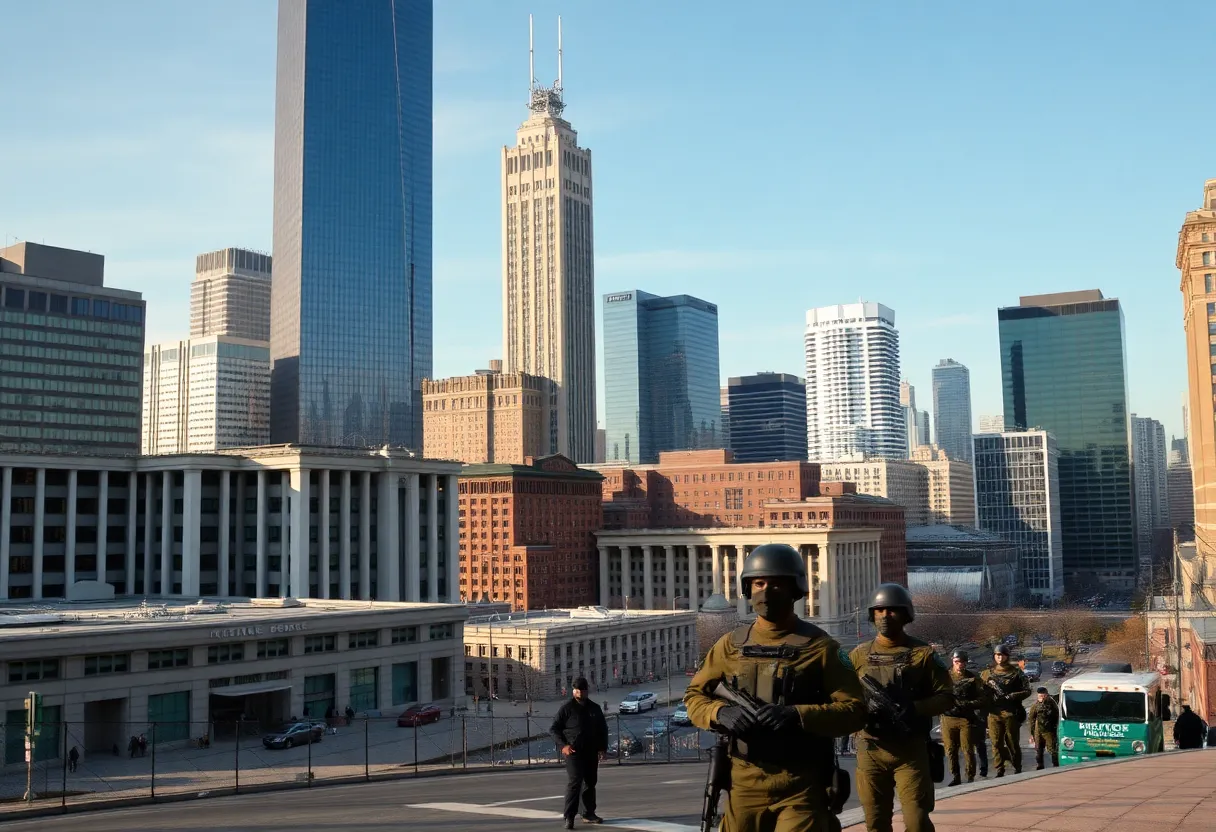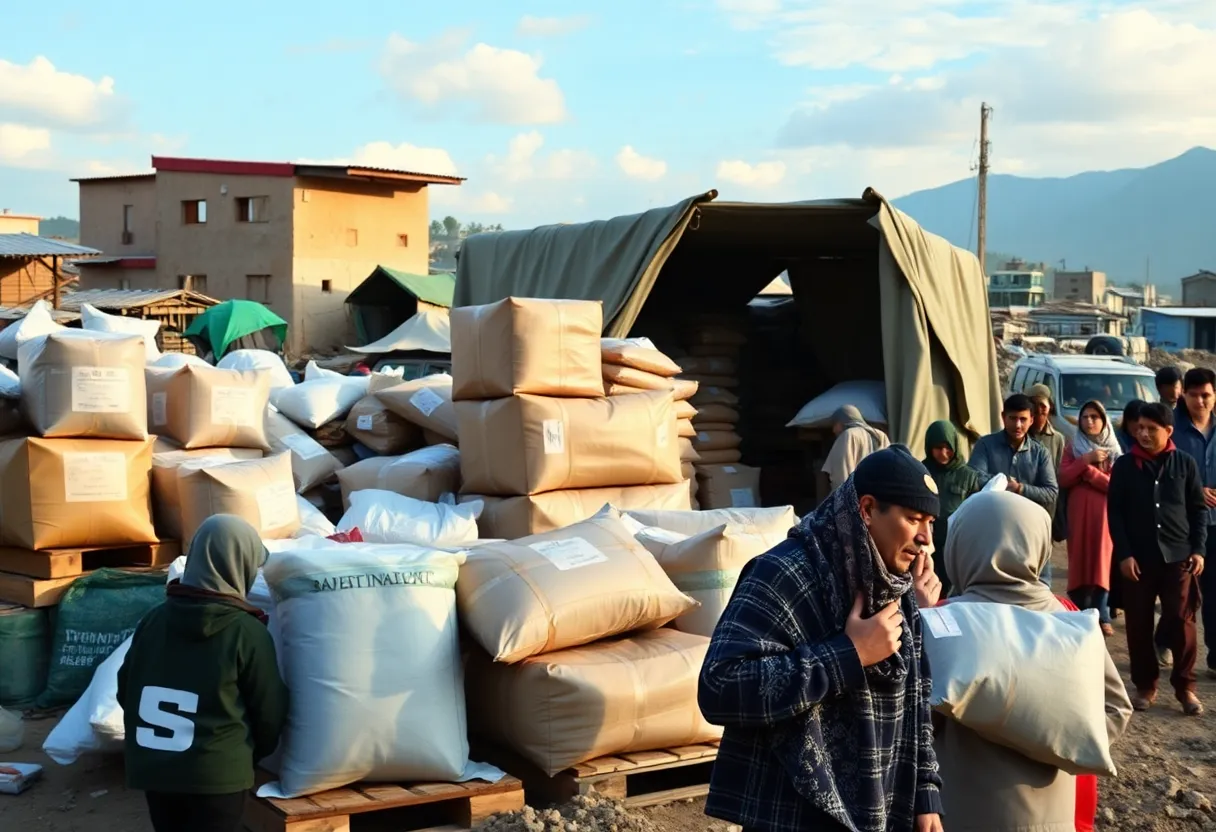Chicago, September 9, 2025
News Summary
The potential deployment of National Guard troops to Chicago is gaining traction following recent actions in Washington, D.C. Support from Texas Republican leaders contrasts with concerns from local officials over federal involvement, especially regarding immigration enforcement. The discussion involves legal complexities of deploying state forces outside their home states while ensuring public safety and managing crime levels. Reactions in Chicago show significant apprehension among community groups and local officials regarding federal interventions.
Chicago — Federal consideration of deploying National Guard troops to Chicago has intensified after the recent deployment of Guard forces to Washington, D.C., prompting support from Texas Republican leaders and concern from local officials and community groups. The discussion centers on expanding a law-and-order initiative announced by the presidential administration, with potential operations tied to immigration enforcement and protection of federal property.
Key developments
President Donald Trump has deployed National Guard troops to Washington, D.C., and signaled the possibility of similar deployments to other cities, including Chicago and New Orleans. Texas Republican officials have publicly praised the D.C. deployment for its role in reducing violent crime and bolstering public safety, and some have indicated willingness to support further federal actions if requested.
Illinois Governor J.B. Pritzker suggested federal plans might include the use of the Texas National Guard in Illinois. Texas officials, including Governor Greg Abbott, have disputed that characterization while not ruling out future troop movements to major cities as part of a broader federal initiative. A governor’s spokesman in Texas said the state is prepared to provide resources in response to a federal request.
Federal and state authority
Legal experts note that a governor cannot unilaterally send a state National Guard out of state; the Guard would need to be federalized for deployment outside its home state, or the receiving state’s governor would have to consent to the presence of another state’s troops. When federalized, the Guard’s missions are typically limited to specific tasks such as protecting federal buildings, assisting immigration enforcement, or supporting designated federal operations.
The District of Columbia operates under a different legal framework, which allowed for a more direct federal role in troop deployment there than would normally apply in membership states. That distinction is important in assessing how readily similar deployments could occur in cities like Chicago.
Scope and limits of proposed missions
- Federalized National Guard missions are usually constrained to clearly defined assignments, such as securing federal property or supporting federal immigration agencies.
- Using Guard personnel for routine criminal law enforcement is atypical; historically, Guard roles have emphasized disaster response and emergency support rather than regular policing.
Political and local reactions
Within Texas, enthusiasm for sending the National Guard into other states exists among some Republican leaders who view such deployments as part of a law-and-order message. At the same time, several Texas officials have expressed reluctance to use the Guard for crime reduction within Texas cities, citing different priorities and constitutional considerations.
U.S. senators and representatives from Texas emphasized respect for state and local authority over policing, with confidence expressed in local leaders’ capacity to manage crime without routine use of additional federal troops. Some members of Congress stressed the need to carefully consider the constitutional and operational boundaries of any domestic troop deployment.
In Illinois and Chicago, officials and community groups have pushed back against potential federal interventions that could involve immigration enforcement. Chicago’s mayor has signed an executive order directing local police not to collaborate with federal immigration agents, and immigrant communities report fear and mistrust regarding more intensive federal action. Protests have already occurred in response to federal immigration operations in the city, and local leaders have demanded investigations into interactions between police and federal agents.
Security, readiness, and civil concerns
Critics of domestic Guard deployments argue that relying on National Guard troops for non-military roles can undermine military readiness and morale. There are historical concerns about deploying military forces in domestic political contexts and the risks associated with blurring the lines between civilian law enforcement and military operations.
Supporters contend that targeted use of Guard personnel can provide immediate resources for guarding critical federal infrastructure and supporting specific federal missions. The debate highlights an ongoing tension between federal authority, state sovereignty, and local governance, especially in cities led by officials who may oppose expanded federal involvement.
Crime and public perception in Chicago
Crime in Chicago remains a contentious public issue. While some metrics, including overall homicide counts, have shown declines, public perception of safety varies across neighborhoods. Local law enforcement faces challenges in maintaining credibility amid increased federal attention, particularly on immigration-related matters, and community trust will be a central factor in any proposed federal or state intervention.
What comes next
The possibility of National Guard deployments to Chicago, New Orleans, or other cities depends on a mix of federal decisions, state consent, and legal mechanisms for federalizing state forces. Discussions among federal officials, governors, and local leaders are expected to continue as plans are evaluated for legal, operational, and political implications.
Background
National Guard forces typically respond to natural disasters and emergencies under state orders, but can be federalized to serve national objectives. The interplay between state governors’ authority and federal power has long shaped how and when Guard units operate domestically. Recent federal emphasis on using Guard forces for public-safety missions has revived debates about appropriate roles for military-trained personnel in civilian contexts.
FAQ
Can the Texas National Guard be sent to Illinois?
No. A state governor cannot send the National Guard to another state without that state’s consent; alternatively, the Guard can be federalized by the president and then deployed outside its home state for specified federal missions.
What missions can National Guard troops perform when federalized?
Federalized Guard troops are generally assigned limited tasks such as protecting federal property, supporting federal immigration enforcement, or assisting with clearly defined federal operations; routine local policing is not a standard mission.
Why is Washington, D.C., treated differently?
Washington, D.C., has a unique legal status that gives the federal government broader authority to deploy forces there, a situation that does not directly translate to U.S. states where governors control their state Guards unless the Guard is federalized.
How are local communities in Chicago reacting?
Reactions are mixed. Some residents and leaders express concern about increased federal enforcement and potential collaboration with immigration authorities, while others support additional resources to address crime. Community trust and law enforcement credibility are central issues.
What are the risks of using the National Guard for domestic policing?
Experts caution that using military-trained personnel in non-military law enforcement roles can reduce military readiness, affect morale, and raise historical and constitutional concerns about militarizing domestic public safety.
| Feature | Current status |
|---|---|
| Potential cities for deployment | Chicago and New Orleans under consideration; Washington, D.C., already received troops |
| State consent required | Yes, unless the Guard is federalized by the president |
| Types of authorized missions | Guarding federal property, supporting immigration enforcement, specific federal tasks |
| Local reaction in Chicago | Mixed—concern over immigration enforcement and erosion of trust vs. calls for additional resources |
| Texas leadership stance | Supportive of federal actions generally; governor disputed claims about immediate troop transfers but signaled possible cooperation |
| Expert concerns | Potential harm to military readiness, morale, and risk of militarizing domestic governance |
Deeper Dive: News & Info About This Topic
HERE Resources
Mass Protests Scheduled in North Texas Against Trump Administration
Protests Planned Across North Texas Against Trump Policies
Texas Deploys National Guard Ahead of ‘No Kings’ Protests
Nationwide Immigration Protests Erupt Amid Enforcement Raids
Protest Against ICE Erupts in Dallas Amid Nationwide Unrest
Rally in Dallas Supports Immigrant Rights Amid Tensions
Additional Resources
- The New York Times
- CNN
- Fox News
- Encyclopedia Britannica: National Guard
- Google Search: National Guard deployment Chicago

Author: STAFF HERE DALLAS WRITER
The DALLAS STAFF WRITER represents the experienced team at HEREDallas.com, your go-to source for actionable local news and information in Dallas, Dallas County, and beyond. Specializing in "news you can use," we cover essential topics like product reviews for personal and business needs, local business directories, politics, real estate trends, neighborhood insights, and state news affecting the area—with deep expertise drawn from years of dedicated reporting and strong community input, including local press releases and business updates. We deliver top reporting on high-value events such as the State Fair of Texas, Deep Ellum Arts Festival, and Dallas International Film Festival. Our coverage extends to key organizations like the Dallas Regional Chamber and United Way of Metropolitan Dallas, plus leading businesses in telecommunications, aviation, and semiconductors that power the local economy such as AT&T, Southwest Airlines, and Texas Instruments. As part of the broader HERE network, including HEREAustinTX.com, HERECollegeStation.com, HEREHouston.com, and HERESanAntonio.com, we provide comprehensive, credible insights into Texas's dynamic landscape.





